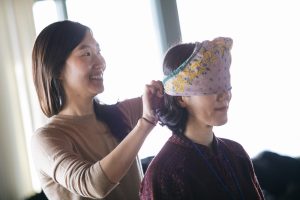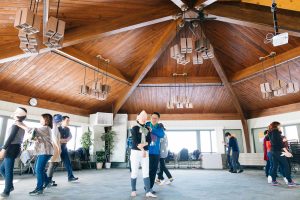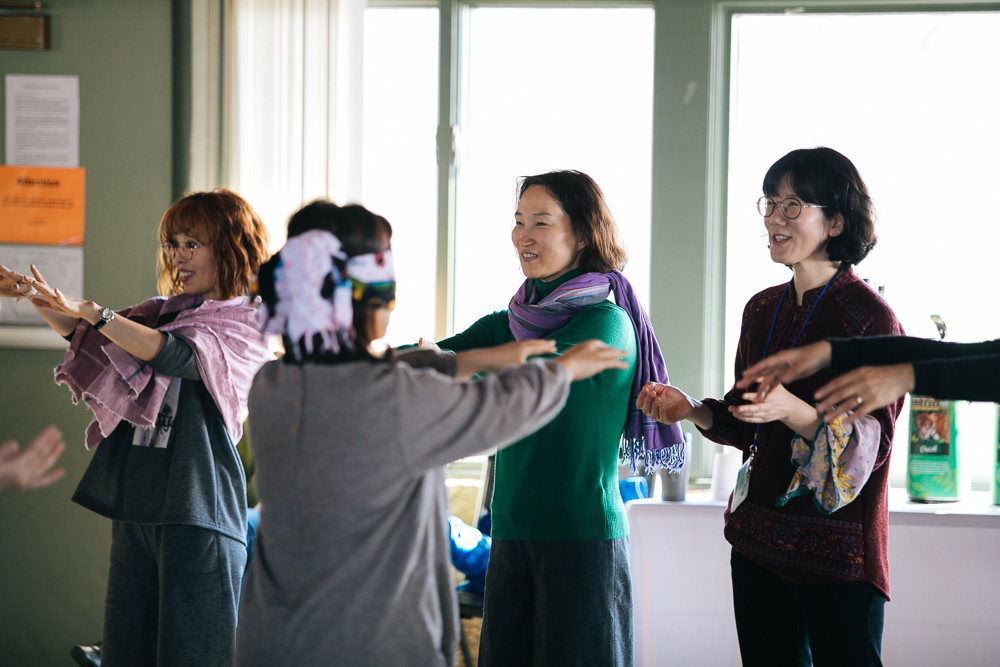South Korean educator Eunkyung Ahn began her studies at Eastern Mennonite University’s Center for Justice and Peacebuilding (CJP) with an intensive short course about trauma and resilience – and she knew she wanted to pass the skills and values she learned to others.
“My key learning at CJP is the importance of embodied learning in peacebuilding, which is new to peacebuilding education here but also in Korea,” she said.
This month, Ahn did just that – hosting a five-day course at EMU on “Building Resilience for Body, Mind and Spirit” for 18 visiting South Korean K-12 educators.
The “arts-based, embodied learning experience was developed to revitalize creativity for working in nonviolent social transformation,” said course creator Katie Mansfield, the lead trainer of the Strategies for Trauma Awareness and Resilience (STAR) program.
Offered in past years at CJP’s Summer Peacebuilding Institute, the course was tailored for this group by Ahn and Mansfield. Goals included an understanding of how systemic and cultural violence affects individual trauma, building resilience in body, mind, and spirit through arts-based, embodied learning, and empowerment for making social change, Ahn said.

“It was an honor that Eunkyung chose to bring her colleagues to CJP and EMU,” said Hannah Kelley, STAR program director. “CJP has been hosting a growing number of US and international groups for short-term trainings like this one. We learn from the people who attend our trainings: the problems in their work, their careful analysis of their context, and their creative and innovative approaches to RJ, trauma awareness and resilience. This group was no exception! These teachers are thoughtful and creative peace-builders, and we were excited to work together for a week.”
Working to transform South Korean educational systems
The educators are members of the Center for Restorative Justice in Education, an affiliate of the Movement for Good Teachers, a Christian teachers association in South Korea. The movement is “a grassroots effort by Christian teachers to transform Korean education with justice, peace and love,” Ahn said. Formed in 2011 in response to a rise in school bullying, the teacher-members are working to promote nonviolence and peace in the school environment.
Course participants Inki Hong, Eunji Park and Byeongjoo Lee are senior teachers at schools in urban neighborhoods near Seoul. Hong and Park teach elementary school in Sang-tan and Gwan-ak, respectively. Lee teaches middle and high school English in Sin-neung; he has also worked in reform schools and in China. All learned about circle processes and restorative justice in different ways, including teacher academies and international workshops, some involving Jae-Young Lee MA ‘03, founder of the Korea Peacebuilding Institute.
Before he learned about restorative justice, Hong says he played the role of a judge with his students.
“Before, when children fight, I would have to decide who is wrong and who is right,” he said. “Now, I don’t decide. I help you figure out what happened and how to make things right. The circle makes equal power and equal power is not usually found in classrooms.”
Children in Korea “do not know how to express themselves,” said Park. “In the circle, they know how. It really develops metacognitive skills.”
Lee, who teaches older children and teenagers, said with a smile that if he used the circle process in class, “my students might think I was crazy.”
“Apart from application,” he said more seriously, “I am learning how the philosophy of RJ can be shaped into many circle styles. The format and philosophy of RJ has emerged to me in a more concrete way, which I find very inspiring.”
All three educators work with newcomer teachers in their home settings and plan to share their learnings in hopes of contributing to culture and systemic change in the educational environment.
Visit to EMU fulfills ‘a dream’

The Center for Restorative Justice in Education has offered international learning opportunities in the past. With other center members, Ahn traveled to Vancouver, British Columbia, Canada, five years ago. A visit to EMU has been “a dream” for the group, she said, and shortly after she arrived at CJP for graduate studies, she began working with CJP faculty and staff.
“I am most appreciative of the supportive efforts of CJP executive director Daryl Byler, Jayne Docherty, Bill Goldberg, Hannah Kelley and Katie Mansfield, who made it happen,” she said.
Docherty is CJP’s academic programs director. Goldberg directs the Summer Peacebuilding Institute, an annual program that offers similar short courses on a range of topics.
Mansfield brings years of experience leading STAR trainings around the globe, many of which are specially adapted to meet specific needs of the hosting group.
The “Building Resilience” course invites learners “to exercise their creative muscle, a critical foundational practice for challenging violence,” she said. Participants engage in visual artistry, music making, movement exploration, poetry and short story development, and final presentations. A session with visiting co-facilitator Ram Bhagat involved drumming and contemplative practices.
Mansfield appreciated the group’s engagement: “I was so impressed at how deeply and directly the educators connected the various expressive arts exercises to the challenges they face as educators, restorative justice practitioners and citizens of Korea.”
Facets of their resilience were expressed, she said, through connections made to the ongoing civil rights journey in the US, “a moving percussion and movement performance about confronting and transcending violence,” and an arts-based lament of/transformative response to the 2014 Sewol Ferry disaster, in which 299 people died, many of them high school students.
Spreading the word
After graduation in May 2018, Ahn will take STAR II. She looks forward to seeing what she has learned since taking STAR I at the beginning of her studies two years ago. Then she’ll take some months to travel and visit spirituality-based peacebuilding communities before returning to her teaching position in South Korea.
“I am so passionate about growing as an educator and helping to educate others about valuing our whole beings,” she said. “It is so important to live with our true selves in our individual and communal lives, and I hope to share that with my students and their parents and other educators in the future.”

Ram Bhagat is a great soul. He has always promoted music.